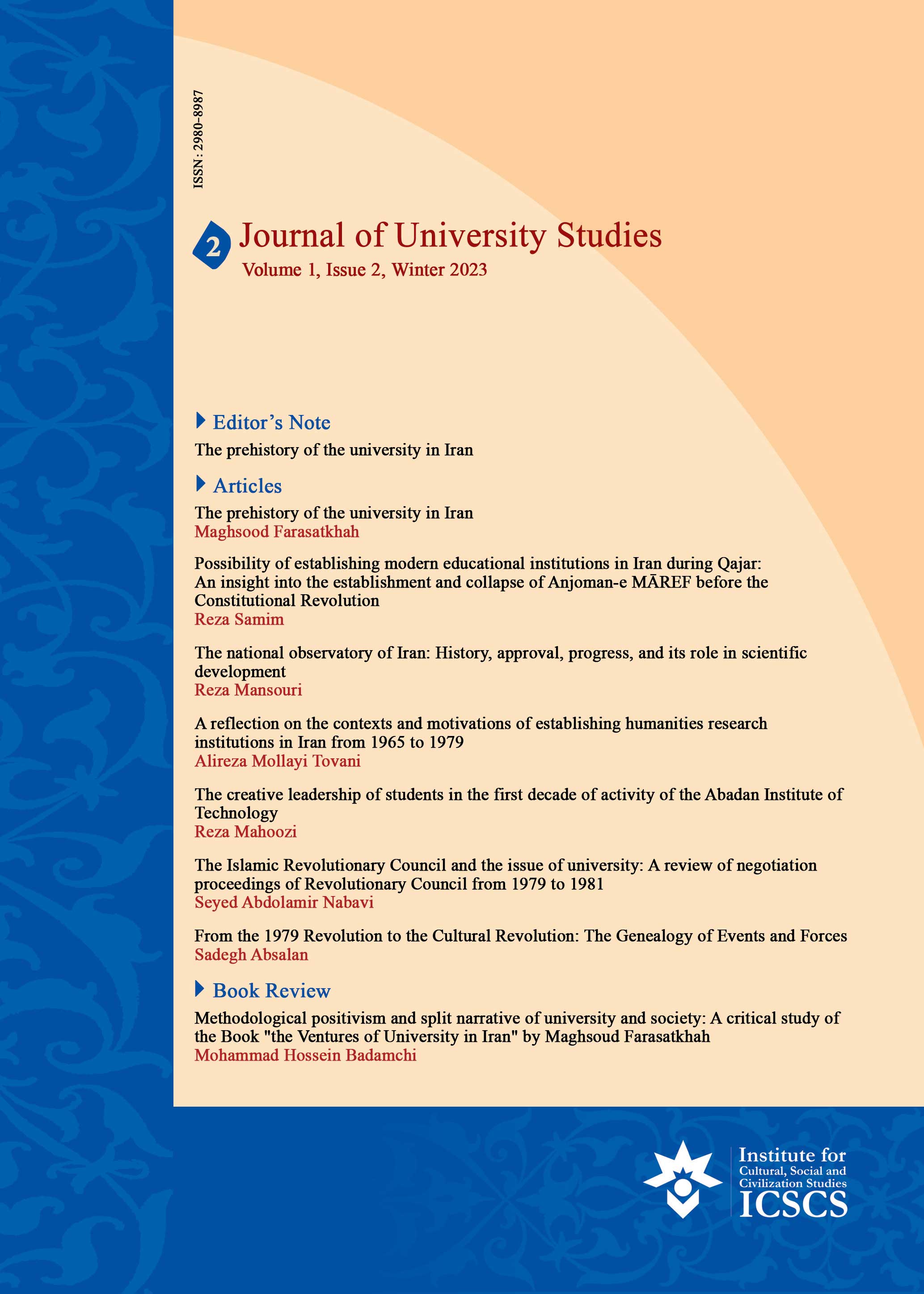Abdollahi, M. (1991). Gholamhosein Seddighi and Sociology in Iran. Social Sciences, 1-2, 11-29. (In Persian)
Ashraf, A. (1997). Gholamhosein Seddighi, founder of Sociology in Iran. Iranian Studies Journal, 15(4), 519-538. (In Persian)
Azad Armaki, T. (1999). Sociology of sociology in Iran. Tehran, Iran: Kalame. (In Persian)
Bagheri, K. (1999). Possibility and the process of knowledge development based on Islamic thought. In: University, Society and Islamic Culture. Tehran, Iran: Ministry of Science, Research and Technology. (In Persian)
Bahrani, M. (2021). Principal and Teleos of University in Iran. Journal of Research and Planning in Higher Education, 27(3), 1-22. (In Persian)
Callon, M., & Law, J. (1994). Reframing and grounding Nonhuman Agency. American Behavioral Scientist, 37(6), 839-856.
Callon, M., & Law, J. (1995). Agency and the hybrid collectif. South Atlantic Quarterly, 94, 481-507.
Farasatkhah, M. (1994). Beginning of modern neo-thinking. Tehran, Iran: Sahāmi-ye Entešār. (In Persian)
Farasatkhah, M. (2009). The past and incedents of Univrsity in Iran. Tehran, Iran: Rasā. (In Persian)
Farasatkhah, M. (2010). University and higher education: global views and Iranian Issues. Tehran, Iran: Ney. (In Persian)
Farasatkhah, M. (2014). 80-years history of College of Engeenering, University of Terhan, Story of a land. Tehran, Iran: Ney. (In Persian)
Farasatkhah, M. (2018). A critique on religious science project and state Islamization of science and universities in Iran. Sāzandegi, 123-124. (In Persian)
Farasatkhah, M. (2020). Humanities in Iran and the Issue of social impact. Tehran, Iran: Institute for Humanities and Cultural Studies. (In Persian)
Farasatkhah, M. (2021a). What did professors of professors: history of higher education from 1918-1978. Tehran, Iran: Ney. (In Persian)Farasatkhah, M. (2021b). Critical view on Iranian historiography. Mardom Nāme, 18&19, 249-263. (In Persian)
Farasatkhah, M. (2022). The occasional university in Iran (4th ed.). Tehran, Iran: Āgah. (In Persian)
Farasatkhah, M. (2023). Boarder actors: 100 early yeasrs, from Shushtari to Froughi generation (3rd ed.). Tehran, Iran: Gam-e Now. (In Persian)
Fayaz, E. (2010). Anthropology of historical science in Iran. Tehran, Iran: Čāp va Našr-e Beynolmellal. (In Persian)
Fazeli, N. (2008). Cultura and University. Tehran, Iran: Sāles. (In Persian)
Ghaneirad, S.M.A. (2002). New method of knowledge production: Ideology and reality. Iranian Sociology, 4(3), 28-59. (In Persian)
Ginzburg, C. (2012). Threads and Traces: True False Fictive (A. C. Tedeschi, & J. Tedeschi, Trans.). Berkeley, CA: University of California Press.
Heidari, A., & Azizabadi, Z. (2021). The internal order of the university: understanding the internal system of knowledge production about the university. Tehran, Iran: Institute for Cultural, Social and Civilization Studies. (In Persian)
Heilbron, J. (2013). The Rrise of Social Theory. Cambridge: Polity Press.
Iranian Socoilogy Journal (2002). Gholamhosein Seddighi, Founder of Iranian Sociology. Journal of Iranian Sociology, 4(1), 161-164.
Latour, B. (2005). Reassembling the Social: An Introduction to Actor-Network-Theory. UK: Oxford University Press.
Lepenies, W. (1988). Between Literature and Science: The Rise of Sociology. New York: Cambridge University Press.
Mansoori, R. (2014). Concept of new science, traditional science and development barriers in Iran. Tehran, Iran: Iranian-Islamic Model of Development Center. (In Persian)
Menashri, D. (2021). Education and the making of modern Iran (M.H. Badamchi, & E. Mosleh, Trans.). Tehran, Iran: Hekmat-e Sina. (In Persian)
Mesbahian, H. (2009). University from history to philosophy. Historical Perspective & Historiography, 19(1), 123-156. (In Persian)
Moseley, F., & Tony, S. (Eds.) (2014). Marx’s Capital and Hegel’s Logic: A Reexamination. Netherland: Leiden.
Nabavi, S.A. (2004). Theoretical and strategic basics of Islamization of universities. Tehran, Iran: Supereme Council of the Cultural Revolution. (In Persian)
Naraghi, E. (1976). West knowledge and east wisdom. Tehran, Iran: Amir Kabir. (In Persian)
Nasr. S.H. (2000). The need for sacred knowledge (H. Miandari, Trans.). Qom, Iran: Tāhā Cultural Institute.
Picon, A. (2008). Utopian Socialism and Social Science. In: T. M. Porter & D. Ross (Eds.), Cambridge History of Science, vol. 7: The Modern Social Sciences. Cambridge: Cambridge University Press.
Pūras, A. (2014). Robert Owen in the History of the Social Sciences: Three Presentist Views. Journal of the History of the Behavioral Sciences, 50(1), 58-78. doi: 10.1002/jhbs.21644
Rafipoor, F. (2002). Iranian scientific development barriers and solutions. Tehran, Iran: Sahāmi-ye Entešar. (In Persian)
Ruholamini, M. (2002). Social science teaching in Iran. In: First National Confrence on Iranian Studies, 17-18 Jun 2002, PP. 281-291. (In Persian)
Samim, R. (2020). Bureaucratic relations in early university (Research Paper). Tehran, Iran: Institue for Cultural, Social and Civilization Studies. (In Persian)
Sharifzade, R. (2018). Negociation with objects: Bruno Latour and Actor Network theory. Tehran, Iran: Našr-e Ney. (In Persian)
Shirazi, M. (1347). Travelouge (E. Ranin, & M. Shahrestani, Ed.). Tehran, Iran: Rowzān. (In Persian)
Shostari, A. (1984). Tohfat-ol-Ālam va zeyl-ol-Tohfāh (S. Movahed, Ed.). Tehran, Iran: Tahoori. (In Persian)
Sziarto, S. (2016). Four reasons in self-defence of history (J. Moradhaseli, Trans.). Kārnāme-ye Tārix, 2(6), 139-159. (In Persian)
Tabatabaei, J. (2019). Considerations about the university. Tehran, Iran: Minu-ye Xerad. (In Persian)
Tajik, M.R. (2004). Uprising of subjugated knowledge. In: Discourse, anti-discourse and politic. Tehran, Iran: Institute for Humanities Research and Development. (In Persian)
Tehran University of Medical Science Islamic Association (N.D). What is dependent university? From the collapse of Shah Regim to Islamic Cultural Revoluton. Tehran, Iran: Jahād-e Dānešgāhi Central Office. (In Persian)
Tehranian, M. (1356). University thought: Investigation on Iranian higher education issues. Hamedan, Iran: Research Center for Communication and Development in Iran, Bu Ali Sina University. (In Persian)
Tolouei, V. (2015). Pre-history of sociology in Iran. Iran Namag, 30(4). (In Persian)
Towfigh, E. (2017). About knowledge system. Tehran, Iran: Institute for Cultural, Social and Civilization Studies. (In Persian)
Yousefi Aghdam, R., & Farasatkhah, M. (2021a). The emergence of the child subject in the Qājār era: An introduction to materiality of the history of ideas in contemporary Iran. Interdisciplinary Studies in Humanities, 13(4), 59-87. doi: 10.22035/isih.2021.4460.4441
Yousefi Aghdam, R., Farasatkhah, M., Zokaeei, M.S., & Nafisi, N. (2021b). New technologies and transformation of "knowledge" and "techne" meaning in Qajar period. History of Science, 19(1), 183-221. doi: 10.22059/JIHS.2021.331872.371653

